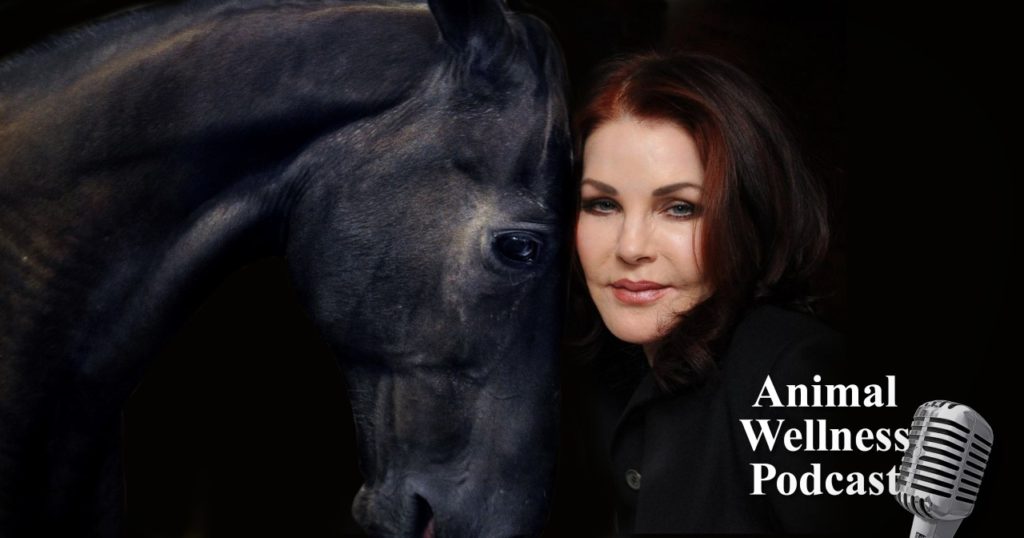Today’s edition of the Animal Wellness Podcast focuses on the seemingly intractable problem of “soring” of Tennessee Walking, Racking, and Spotted Saddle Horses — a kind of torture that involves injuring the pasterns or the bottom of the foot to induce an exaggerated high-stepping gait. Abusive trainers apply caustic chemicals such as mustard oil, croton oil, and diesel fuel to the skin or insert sharp objects under the hooves to achieve an artificial pain-based gait known as the “Big Lick,” that’s prized among a segment of Walking horse operators across the Southeast., primarily Tennessee and Kentucky.
To talk about the way we’re going to turn around this problem, we’re joined by special guests Priscilla Presley, who has joined us on Capitol Hill on numerous occasions pushing for the end of soring, and my friend of 15 years, Monty Roberts, the “Man Who Listens to Horses,” arguably the most world-renowned figure in the equine world, a trainer who has long spread the principles of natural horsemanship.
In 2012, during my final year as president of the Tennessee Walking Horse Breeders’ & Exhibitors’ Association, Wayne Pacelle came to Tennessee to meet with me, and discussed how we might bring soring to an end. I’d long been working to end the practice and had been trying to make change from within the breed but failed in every attempt and at every turn. The old guard among enthusiasts for the breed, being very short-sighted, were committed to the status quo and inducing this artificial gait in the horses. An undercover expose Wayne had authorized appeared on ABC Nightline that showed a champion trainer, Jackie McConnell, beating and soring horses in a stomach-churning way.
The day the expose ran, I happened to be judging a horse show in Germany where none of the soring or abuse had or would ever occur – and I saw the world’s reaction to the abuse. I knew then that I had to step up my work to stop this cruelty. I knew I would face incredible resistance, and I knew speaking out publicly about the soring I’d witnessed since the age of 4 would come at a high personal cost. But I’ve often followed the motto: “feel the fear and do it anyway,” because fear is what enslaves us, and fear is what has kept soring alive.
The day that Wayne and I met, we hit it off, and for the past eight years we have been working together to pass the U.S. Senator Joseph D. Tydings Memorial Prevent All Soring Tactics (PAST) Act, H.R. 693/S. 1007 that would finally end soring by eliminating the use of large stacked shoes and ankle chains placed on the horses’ feet to exacerbate the pain, eliminating the industry’s failed self-policing program and replacing it with licensed USDA inspectors, and implementing felony-level penalties for perpetrators of illegal soring.
That anti-soring bill has been introduced on five occasions in the U.S. House, and four occasions in the U.S. Senate. Other legislation to address soring has been introduced since 1970 — almost 30 different measures since the passage of the Horse Protection Act, and none of them have effectively stamped out soring despite broad support from a majority of lawmakers in the House and Senate.
And as expected, the Tydings’ PAST Act has stalled this go-around powerful U.S. Senators representing Tennessee, Kentucky, and other southeastern states believe enacting it will kill the breed and their industry. I disagree with their thought process, but our nation’s founders made it difficult to pass legislation and they gave power to even a small number of Senators to slow or stop legislative action. They designed the political process to be built around compromise, forcing key parties to sit down and find a way forward. The PAST Act as written is without a shadow of a doubt, dead in the U.S. Senate, and for many years to come, it’ll remain buried six feet under piles of other legislation that have met the same fate.
Recognizing that irrefutable fact, we’ve forged a compromise, proposed revisions to the PAST Act that’ll accomplish 90 percent of what the original bill did and will also ban terrible devices known as tail braces that the original PAST Act failed to address. That compromise has been blessed by leaders of the Tennessee Walking Horse industry — the very folks standing in the way. These key players, possessed with outstanding political connections, recognize it’s time to change. As Monty Robert’s says in the podcast, “Don’t hit back. Show them, help them, and respect them.”
Tune by clicking this link to hear what Priscilla and Monty have to say in support of our efforts to bring resolution to the PAST Act. I am grateful to all of the people who joined together to negotiate a deal to end this scourge of soring. It was tough, imperfect work and I am reminded of the words of President Teddy Roosevelt:
“It is not the critic who counts; not the man who points out how the strong man stumbles, or where the doer of deeds could have done them better. The credit belongs to the man who is actually in the arena, whose face is marred by dust and sweat and blood; who strives valiantly; who errs, who comes short again and again, because there is no effort without error and shortcoming; but who does actually strive to do the deeds; who knows great enthusiasms, the great devotions; who spends himself in a worthy cause; who at the best knows in the end the triumph of high achievement, and who at the worst, if he fails, at least fails while daring greatly, so that his place shall never be with those cold and timid souls who neither know victory nor defeat.”
Marty Irby is the executive director at Animal Wellness Action who was recently recognized by Her Majesty, Queen Elizabeth II, for his longtime work to end the practice of soring.
